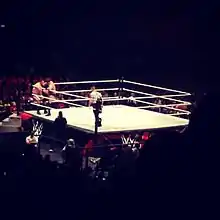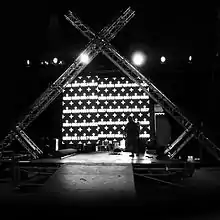House show
A house show or live event is a professional wrestling event produced by a major promotion that is not televised, though they can be recorded. Promotions use house shows mainly to cash in on the exposure that they and their wrestlers receive during televised events, as well as to test reactions to matches, wrestlers, and gimmicks that are being considered for the main televised programming and upcoming pay-per-views.


House shows are similar to dark matches—an untelevised match that occurs as part of an event that was already being televised. House shows are also often scripted to make the face wrestlers win most matches, largely to send the crowd home happy. If a heel defends a title, the face may win by disqualification, preventing the title from changing hands.

Until the late-1980s, most major matches and title changes happened at house shows, largely due to the costs and infrastructure required to produce television programs at the time. They were taped in small studios, and featured squash matches, run-ins, and promos which revolved around feuds to be settled at the house show. Some of these big matches later aired, often scheduled "for TV time remaining", which usually ran out as the match built to a finish—enticing viewers to attend a show themselves.
Since the advent of weekly shows such as the WWF's Monday Night Raw and WCW's Monday Nitro—where matches and storylines play out as they happen in front of a live audience—and the gradual increase in the frequency of pay-per-view programs during the 1990s, angles are now typically developed during television series for resolution during a pay-per-view event (or, on occasion, a special episode of the series). WWE does use live events, called "WWE Live" (or for NXT, "NXT Live"), to promote its flagship pay-per-view WrestleMania, typically branding a tour in the early months of the year as part of the "Road to WrestleMania".[1]
Production

Since house shows are not televised, promotions do not usually deploy the setup for staging or pyrotechnics used for their television counterparts. In the past, a WWE house show would consist mainly of a ring, essential lighting, and a crowd.[2] In late 2011, WWE invested US$1.5 million in production improvements, which included three LED-lit entrance stages (one for Raw, one for SmackDown, and one backup)[3] featuring a ramp and video display. They also began utilizing the arena's multimedia equipment to play wrestler entrance and promo videos. These house show were in turn branded as "WWE Live" (with their NXT brand using the name "NXT Live" for house shows).[2]
Because house shows are not televised, sometimes controversial things occur during them (although this is rare) which might not happen on a televised show. For example, on May 19, 1996, the MSG "Curtain Call", which was also a rare example of a shoot, occurred at a house show taped at Madison Square Garden. At the same show, The Bodydonnas lost their WWF Tag Team Championship to The Godwinns.[4]
With the advent of WWE Network, WWE has televised portions of what are otherwise house shows as hour-long specials on the service, such as Starrcade — an event that shares the name with the flagship pay-per-view of the now-defunct WCW (whose assets were acquired by WWE), and The Shield's Final Chapter—a special which featured Dean Ambrose's final WWE appearance with his stable The Shield before his departure from the promotion.[5][6]
Title changes

Most major promotions try to develop their angles only during televised shows and will rarely book a major development (such as a title change) for house shows. House show title changes can occur both to test the reaction of the win or as a "special treat" for a specific audience. Edge was given his first Intercontinental Championship win over Jeff Jarrett in Toronto[7][8] to excite the fans in Edge's hometown.[7] As per usual, he dropped the belt back to Jarrett the following evening at Fully Loaded.[9]
Even rarer is the top title of a promotion changing hands. This has occurred relatively few times, a notable occurrence including Diesel winning the then WWF Championship from Bob Backlund in 1994 at a live event in Madison Square Garden.
If there is a title change, the title usually changes back during the same show or at another show on the loop before another televised event, like several titles changes of the WWE Hardcore Championship or when Booker T and Chris Benoit traded the WCW World Television Championship back-and-forth on several house shows, with Booker (the official champion) always having the title back in time for Nitro.
There is also times when a title change happened and isn't recognized by the promotion. Some notable house show title changes include an August 10, 1987 match where The Rougeau Brothers (Raymond and Jacques) went over the champion Hart Foundation (Bret Hart and Jim Neidhart) to take the WWF Tag Team championship in the Rougeau's home town of Montreal. This change (and the eventual "decision reversal") was only ever mentioned during segments taped specifically for and shown in the Montreal market. A similar incident occurred in 1990 when The Rockers (Shawn Michaels and Marty Jannetty) took the title from the Hart Foundation. During the match a problem with the ring ropes meant the match could not air on television as originally planned, so kayfabe President Jack Tunney "reversed the decision" in print media which had reported the change before the decision not to air it was made. The match was not acknowledged on television at the time.[7]
As a metaphor
In 2019, Shawn Michaels defended his one-off return at WWE's 2018 pay-per-view Crown Jewel in Saudi Arabia (reuniting D-Generation X to participate in a tag team match against The Brothers of Destruction) despite his retirement, describing the event as being a "glorified house show" that was not as important as WrestleMania or "coming back as the Heartbreak Kid".[10] The phrase has also been used by others to pejoratively describe WWE's Saudi Arabian events[11][12] as well as previous UK-only pay-per-views such as Insurrextion and Rebellion.[13]
References
- Meyer, Maredithe (2019-12-23). "WWE returning to Fiserv Forum next year". BizTimes - Milwaukee Business News. Retrieved 2019-12-24.
- Bishop, Matt. "House show upgrade helps WWE show in East Lansing". Slam! Sports. Canoe.ca. Retrieved 3 May 2013.
- Styles, Joey; Patts, James. "WWE debuts set for live events". WWE.com. WWE. Retrieved 3 May 2013.
- "The Godwinns's First Reign". World Wrestling Entertainment. Archived from the original on 2007-07-03. Retrieved 2007-06-20.
- "The Shield's Final Chapter live results: Ambrose's farewell match". F4W. 2019-04-21. Retrieved 2019-12-02.
- "WWE moves Starrcade to YouTube amid WWE Network outages". Awful Announcing. 2019-12-01. Retrieved 2019-12-02.
- TJ Madigan (August 16, 2003). "Final chapter for Booker T?". SLAM! Wrestling. Retrieved 2008-04-17.
- Copeland, Adam (2004). Adam Copeland On Edge. World Wrestling Entertainment Books. p. 130. ISBN 978-1-4165-0523-5.
- Copeland, Adam (2004). Adam Copeland On Edge. World Wrestling Entertainment Books. p. 131. ISBN 978-1-4165-0523-5.
- Rueter, Sean (2019-06-24). "Shawn Michaels still says his comeback at 'glorified house show' Crown Jewel doesn't count". Cageside Seats. Retrieved 2019-10-29.
- "Piledriver: Bad reviews for 'Greatest Royal Rumble'". The Montgomery Advertiser. Retrieved 2019-10-29.
- Beaston, Erik. "WWE Raw Preview: Money in the Bank Fallout and More for May 20 Episode". Bleacher Report. Retrieved 2019-10-29.
- Furious, Arnold. "The Furious Flashbacks – WWF Rebellion 2000". 411Mania. Retrieved 2019-12-12.